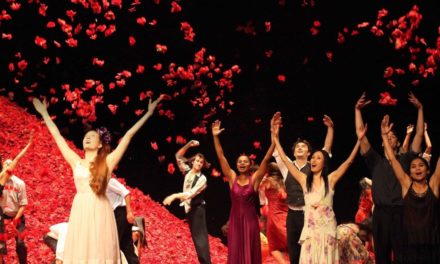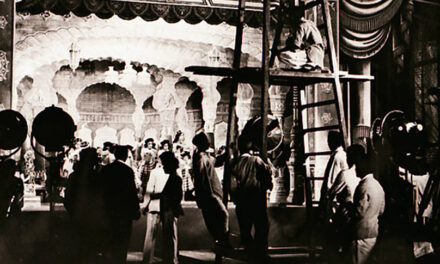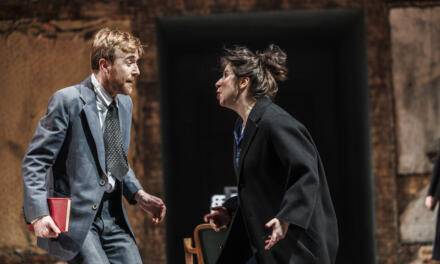The past weekend witnessed the culmination of a global theatre project at Theater Freiburg, an independently owned cultural space in Baden-Württemberg, Germany, with a provenance that dates back two centuries. Since the autumn of 2015, the Human Trade Network, which is supported by the German Federal Cultural Foundation, has facilitated a creative consortium of theatre companies from three continents to research perspectives on human trafficking and modern slavery worldwide.
One of the collaborating teams is the prolific Indian Ensemble from Bengaluru, which operates under the stewardship of the multifaceted Abhishek Majumdar. The four theatrical productions that emerged from this exploration were showcased at an event, dubbed ‘The Meeting,’ that commenced June 21 at Theater Freiburg. Apart from the performances, it featured a packed itinerary of talks and interactions and concluded with a joint lecture-cum-performance at the Kammerbühne (the chamber stage) involving all partners, a ‘theatrical try-out’ they have been working on since coming together in Germany.
Majumdar’s presentation was the play #supernova, performed in Hindi and Bhojpuri, which had its Indian premiere earlier this month, with two shows at the Max Mueller Bhavan, Bengaluru. Written by upcoming playwright Rahul Kumar Rai, and performed by Avneesh Mishra and Sandeep Shikhar, it recounts the tale of a young boy from eastern Uttar Pradesh who is sold to the flesh trade in Dubai. There, he acquires the online persona of #supernova, a so-called exemplar of sexual virility, an identity that sends him inexorably spiraling down the rabbit-hole of sexual subjugation.
Although India has the most trafficked children in the world, Majumdar had never imagined that he would ever work on the subject. As his team researched further, they realized how the world of cyber trafficking of children is more ruthless than other conventional modes of human trade. In an interview with the Human Trade Network, Majumdar said, “The morality of the Internet, the ethics of communicating online, the possibilities of every changing persona were all discoveries for me in this project. Poverty is no longer the only marker. Gullibility and susceptibility are themselves equally dangerous.”
Common Causes
The international partners of the Human Trade Network worked in tandem with each other. This took the Indian Ensemble to Western Africa’s Burkina Faso in July last year, to collaborate with Ouagadougou’s Théâtr’Evasion, whose presentation is titled Adjugé!. In this play, an employee in a sugar plantation is dismissed before he is entitled to a pension. He starts working as a daily wage laborer, sinking into debt. Hopes for a better life for his children soon recede from view as the specter of child labor raises itself. The Romanian contribution, called Do you speak Silence? / Vorbiți tăcere? is a performance by Gianina Cărbunariu, widely regarded as the ‘enfant terrible’ of the contemporary Romanian stage. Its blurb reads, “Dignity and freedom of decision – do these things play a role in buying and selling labor? What defines us apart from our strength? A game with identities, perspectives and deceptive conclusions.”
Also set in Romania is the German production, For Sale. Director Clemens Bechtel, who also serves as the artistic director of the Human Trade Network, has collected varied stories with a team in Bucharest, which illuminate the subject of child trafficking from myriad perspectives. On their research trips, they dealt with construction workers, butchers, caregivers, harvest hands, adoptive parents, and prostitutes. As Bechtel said, “The fact that in all these cases human trafficking plays a vital role, was not clear to me beforehand. Either it was how easily I too am part of this system, or how easily I can become a ‘human trafficker’ or ‘human buyer’.”
Cross-Cultural Focus
It was on Bechtel’s invitation that Majumdar came onboard. “Sometimes when the subject is so vast, and the group so rigorous, it makes absolute sense to begin one’s journey on someone else’s impulse,” he said. Bechtel had earlier served as the artistic director of the Hunger for Trade project, which provided a similar international setting for theatre research and experimentation, to which the Indian Ensemble had contributed Thook in 2014. That play was written by Irawati Karnik and Shikhar, and focused on the effects of neo-liberal reforms on the Indian economy. This globalized approach to theatre-making and the negotiations that ensue bring about dialogue and a nuanced understanding of the complex issues at hand. Bechtel said, “I am interested in the way people from other cultures look at such a topic, what approaches they choose in their theatrical approximation during their analysis. I want to get to know people from the countries of the south as agents, not just as victims or a surface for projections of myself.”
This is echoed in Majumdar’s prophetic words, “We are heading towards the era of transience. More people would have moved home in this century than ever before in the history of mankind. We are also potentially the swan song generation of somewhat homogeneous identities and in the future, we will be more mixed than ever before. [Thus] it makes absolute sense to open our vision and dialogue within a global present and not the global absent of wealthy corporations whose presence is only felt on advertisements and shelves. The possibility of a pure relationship with someone far away is crucial to humankind discussing anything at all in humanities.”
This article was posted to The Hindu on June 27, 2017 and has been reposted with permission.
This post was written by the author in their personal capacity.The opinions expressed in this article are the author’s own and do not reflect the view of The Theatre Times, their staff or collaborators.
This post was written by Vikram Phukan.
The views expressed here belong to the author and do not necessarily reflect our views and opinions.


















